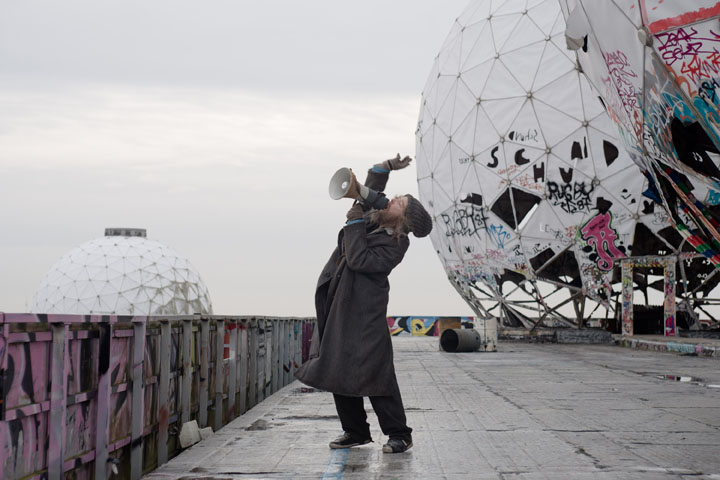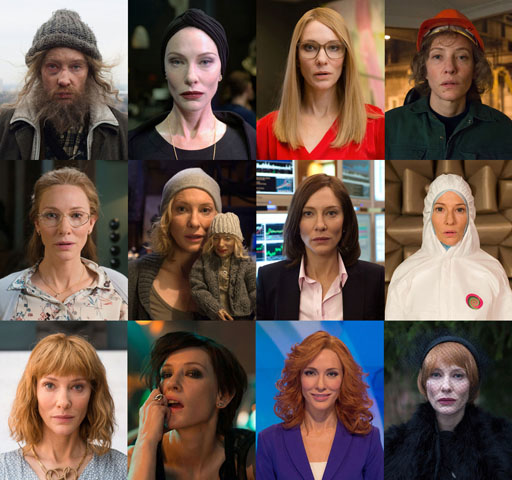(Berlin.) At some point during a visit to European Manifesta Biennale, filmmaker-slash-artist Julian Rosefeldt was struck with an idea: Art history abounds with artist written manifestos, is it not about time to unite them all in one filmic mega mix? Also, he wanted to do something with Cate Blanchett for a while, but couldn’t decide on a role (you know how it is). Or so we assume. What we know for sure is, that in December 2015, Manifesto, an installation of 13 videos starring double Academy Award winner Catherine Élise "Cate" Blanchett and a lot of manifestos premiered at Sidney’s ACMI before arriving at Berlin's Museum Hamburger Bahnhof this February. Maybe the Australian actress was not Rosefeldt’s choice at all, but generously provided by the co-producers from Down Under who in return insisted on the first screening.
The concept of Manifesto is simple: Take a dark exhibition space with thirteen screens and one tiny bench in front of each – visitors are not expected to sit down and watch each film through, but to wander around and experience the whole. Each film has Blanchett in another role, in another disguise and setting, to recite from manifestos that range from philosophy/politics: Charly Marx, to art: Dada and all sorts of –isms, to film: Dogma. Most date from the 20th Century, the Golden Age of manifestos; nobody knows when and how the genre was invented – maybe the Stone Agers had theirs already (“The history of mammoth hunting is a history of spears. We don’t want to use spears anymore!”).
We visited Manifesto on International Women’s Day (still wondering if, in the context of contemporary linguistic cleansings, that had not better change for “Global day for people with Y-chromosome”), and admired Mrs Blanchett doing just everything. The scenes - there’s no narrative other than situational – cover most aspects of modern life, including a family dinner, an elementary school lesson, a broker firm, manual/industrial work, a news show, a funeral, scientific research, a Rock concert and more entertainment: Blanchett as a puppeteer (not quite as convincing as Anthony Hopkins was in Magic).
It starts off slowly, though. Indeed, there is a prelude right behind the entrance, with only a burning fuse to accompany the actress reciting from an anti-manifesto: “I only talk for myself”. Next comes Cate as a male hobo - beard and sneakers could trick you into thinking "hipster" - walking dog and trolley over an abandoned industrial site. The image quality is overwhelming, this second film reminded us of photographs by Yves Marchand&Romain Meffre. Slowly, (s)he passes a monkey sitting on top of a trash pile and a gang of senior citizens dementedly shooting up fireworks. When Blanchett finally starts on the monologue, the few parts we understood sounded rather political than art-related. We could not avoid thinking, the only ones responding to those lines about capitalism in crisis will be successful art dealers demanding where exactly this was filmed – it’s the perfect site for another mega gallery. Only later we realized that here as in all films, it’s not a single manifesto, but a collage/cut-up from many.
Somebody once told us, the portrayal of a drunk person poses one of the biggest challenges for an actor: On the one hand you need to be convincing, on the other, the audience should still be able to follow your text. Unfortunately, Mrs Blanchett, as gifted an actress as she is, focuses mainly on the first task (and, sadly, her movements border on parody). She unintelligibly shouts through a megaphone, a lone voice in the wilderness, a whistling in the dark, the loser’s complaint. Suddenly you realize that part of the trouble is caused by all those other films whose soundtracks simultaneously flood your ears. You turn around to continue to the main space, and find yourself surrounded in a cacophony of sound and vision. This should be the moment you understand, the individual manifestos don’t mean nothing at all, this is an abstraction, a transfer to something meta. Apologies to Mrs Blanchett - it’s not her fault. You’re not supposed to connect sound and image. Words are white noise, not important individually, but standing for a type - Manifesto is not about manifestos, otherwise Julian Rosefeldt would have published an anthology (yes, books sell less expensive, but still).
If the individual texts are unimportant, fragmented, lost in the overlapping multitude, imposed on by images, then what is this about?
Our guess is, the human compulsion to generalise, to manifest an idea. A means to master life, to subdue its countless phenomena, to arrange, and to make rules, that’s what a manifesto does, it postulates a view on the world, and it decrees what shall be done henceforth. There’s an easy recipe to write your own: “F%$k everything that came before, I/we’ve found the philosopher’s stone, and here it is: Thou shalt...” That’s what makes Marx prototypical (not from the Communist Manifesto that Rosefeldt uses, but from the Theses on Feuerbach): “Philosophers have only interpreted the world differently, the point is to change it." In other words: “Let’s write a manifesto”. This is, and that shall be. Give your verdict on the past and project your will into the future, don’t report: proclaim. There’s a manifesto for everything.
Julian Rosefeldt inquires into the nature of Manifesto, the type, not its many(/i) festations. He uses examples to unveil the concept’s irrelevancy, the hubris behind, and at the same moment, he postulates one himself: The films correspond to that first part of any manifesto that condemns the past. Periodically, all personae, on all screens, stop short, and speak in a choir (a nice effect: the multiplication of the self; the single actress in the schizophrenic act of acting multiplies, and the individual voice becomes legion), to negate all truths and manifestos in one nihilist manifesto of the present. This might be another quotation, but it's surely endorsed by Julian Rosefeldt.
You cannot manifest your thoughts without creating a manifesto. Every generalization with a call to action belongs to the same category, even if it expressively rejects it. The word’s etymology points to "manifestare", “to make public”: a manifestation of thoughts in speech. Theoretically, an unspoken/-written manifesto would be nothing different, if only announced to the thinker himself. A manifesto stands for the human habit to subdue the world by explanation. Giving principles to life holds a society together. It might be vain, but it’s only human.
“Rosebud, er: –feldt.”
Julian Rosefeldt, Manifesto, 10 February to 10 July 2016, Hamburger Bahnhof, Berlin




Comentários